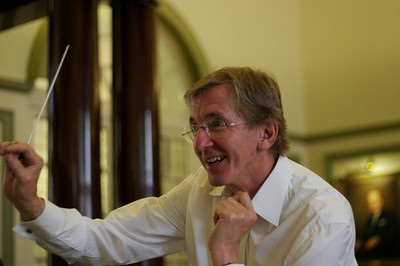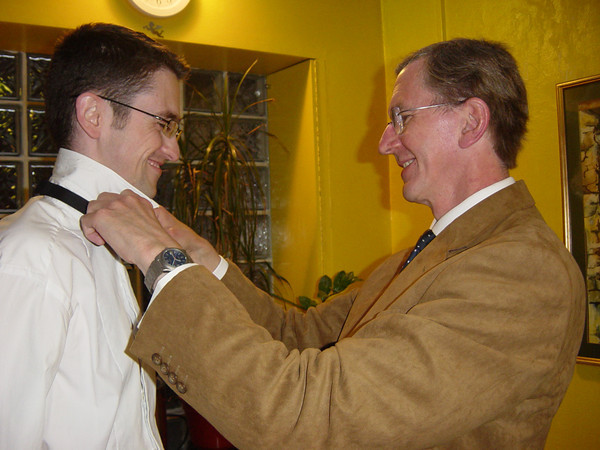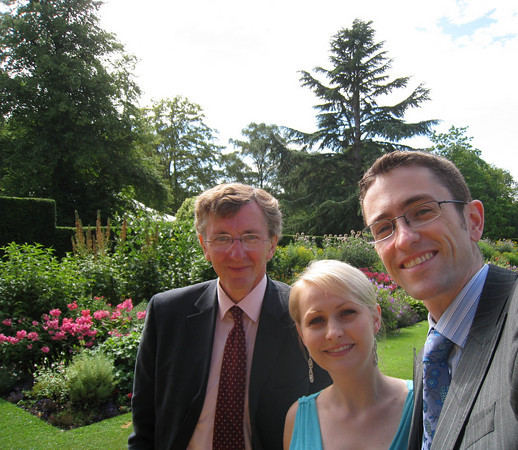 Our dear friend Alan died yesterday. After more than four years of continually surprising the medical profession he finally lost his battle with cancer.
Our dear friend Alan died yesterday. After more than four years of continually surprising the medical profession he finally lost his battle with cancer.
I first met Alan in 2000 after getting in touch through the Guildhall School of Music and Drama. I was looking for a conducting teacher and we arranged to meet at the Guildhall. I was a bit nervous but we talked about conductors and conducting and I waved my arms a bit to show him what I could do. He seemed to see some potential so we started the first lesson right then and there. It was in that first meeting that I learned one of the most important aspects of conducting: the idea that the arm needs to have a kind of ‘weight’ and it must move in a natural way as if guided by gravity, like a bouncing ball.
From then on for about four years I would make the weekly trip up to Finsbury Park to Alan’s flat for our lessons. I remember being very excited to be studying conducting again and would make notes of everything. We studied scores and tried to work on my limited keyboard skills combining both by playing the Art of Fugue score in four different clefs on the piano. Alan impressed on me the importance of the conductor knowing about all the instruments in the orchestra, even to the point of being able to play each one. In this spirit I borrowed his trombone for a while but didn’t really succeed in making more than a few fumbling notes out of it.
 We would also discuss what I needed to do to further my conducting career but, like Alan, I always found the self promotion stuff hard. Each week he would ask “What news?” and I would usually have to sheepishly reply with some lame excuse about how busy I’d been at work. “JFDI, Just … Do It” he would say and I stuck this motto to my mirror to remind me every day. But if it weren’t for Alan I’m sure I never would have done as much as I have. It was only through his encouragement (and Kathryn’s support) that I started doing concerts in London. No matter how small the audience he was always there and encouraging. I remember at the first rehearsal for my first concert I arrived at St Giles to discover I had left half the music at home so while I started the rehearsal Alan and Kathryn made a dash in his car across London to fetch the music. This was Kathryn’s first experience of Alan’s unique driving style.
We would also discuss what I needed to do to further my conducting career but, like Alan, I always found the self promotion stuff hard. Each week he would ask “What news?” and I would usually have to sheepishly reply with some lame excuse about how busy I’d been at work. “JFDI, Just … Do It” he would say and I stuck this motto to my mirror to remind me every day. But if it weren’t for Alan I’m sure I never would have done as much as I have. It was only through his encouragement (and Kathryn’s support) that I started doing concerts in London. No matter how small the audience he was always there and encouraging. I remember at the first rehearsal for my first concert I arrived at St Giles to discover I had left half the music at home so while I started the rehearsal Alan and Kathryn made a dash in his car across London to fetch the music. This was Kathryn’s first experience of Alan’s unique driving style.
Music is: A non-specific human language consisting of organised sound on a background of silence on a framework of time.
Soon after starting lessons I joined his orchestra and this was a chance to not only play in a great band but also watch rehearsals. I would take my scores along to rehearsal and we would discuss how it went at lessons. I think I only did one concert before Kathryn also joined the orchestra. I know she was a bit afraid of Alan at first, worried that he would make her play something on her own but she soon realised he wasn’t as scary as she first thought. Over the years we three became close friends. On this day exactly three years ago Alan was there to see us become British citizens.
I think Alan was always a bit disappointed that he didn’t achieve the same fame in his conducting career as his grouchy old teacher Sergiu Celibidache but there are more important things in life than fame. He made a lasting impression on hundreds of people; directly through friends, students, orchestra members and audiences, and indirectly through students passing on his influence and what he taught them. Eight years is quite a long time to know someone but at the same time not long at all.
Alan Hazeldine, conductor, pianist and teacher was born on July 5, 1948. He died of cancer on November 10, 2008, aged 60.

Very well-written, David.
I feel embarassed to admit that I too, took a handful of conducting lessons from Alan.
Embarassed, as I didn’t do anything to further that dream, even though he kept telling me to have more faith in myself. Somehow, at that time, I couldn’t imagine myself facing a group of musicians (even amateur, let alone professional), and tell them what to do. It’s my loss, I know. But at the time I was working so many shifts, etc in hospitals, that I just couldn’t fit in things like learning to read a score. And my keyboard skills then were even more limited, although now I have begun taking lessons. Eventually, as work took me further and further away from London, the lessons stopped.
But I do remember those two points you mention. He taught them to me too, on my first day.
I remember him telling me to imagine being suspended by an imaginary string from the top of my skull, and feeling the “dead weight” of my arm, and how to use that to articulate the beat.
He also taught how the baton should be a natural extension of the forearm bones, how it should feel relaxed in the palm rather than clutched.
To me, every CCO rehearsal was a master class of sorts. On conducting, on music appreciation, on repertoire, on orchestral playing, even on public relations. It takes a particular skill to keep 40-odd people engaged and interested for 3 hours, and enjoy what they are doing. I’ve been part of bands in the past where I was bored to tears. Never happened with the CCO! Never happened with Alan!
I remember Alan telling me that a conductor’s career stood on 4 “legs”. I can’t remember all of them, but I do remember that the fourth leg was “promoting oneself”, and he freely admitted that it was one thing that he had not done enough about. Some conductors (and indeed this is true in all spheres of life) just have an innate savviness, a self-marketing ability; other don’t, and have to work hard at it.
It was great fun playing under your baton, in the Austral Sinfonietta. I am sure we’ll play again soon. Perhaps you could conduct a tribute concert to him?
Very well written, David. I feel like I might have liked to get to know him.
David,
Welcome thoughts on Alan. Thankyou.
I studied conducting with Alan at The Guilhall School of Music from 1993-96.
He was a fantastic man and teacher. Behind the rather sometimes dour Scottish exterior was a man of great intelligence and warmth, totally devoted to helping out young conductors ( something that many more celebrated maestros are not!). I felt that he had really thought through the difficulties of being a conductor. He was very good on the whole psychology of conducting i.e. how to get the best out of of your players etc. He was not at all keen on the idea of conductors being power-driven megalomaniacs! He stressed the importance of a clear technique and thorough knowledge of the score. Although, he advocated the fact that conductors, however talented, were nothing without the knack of self-promotion and the ability to win other musicians over. In fact, I learnt more about this aspect of conducting with my frequent chats with him than all my subsequent conducting studies in the US and variuos masterclasses.
I believe that the basic conducting technique which he taught, based on the Celibidache school of rebound beat, was very sound. It certainly works well with all the amateur choir and orchestras which I conduct. Of course, there are many other approaches to conducting and Alan accepted them although was quick to point out the limitations of other systems.
I know that Alan probably deserved greater recognition in his own career. How many other highly talented musicians can be put in this bracket? However, his importance as a teacher of conducting is more significant. He was the best conducting teacher in the UK ( I do not want to be provocative here, I genuinely feel this to be the case).
May you rest in peace Alan or be enjoying the heavenly orchestras. Either way, a life well spent.
Mark